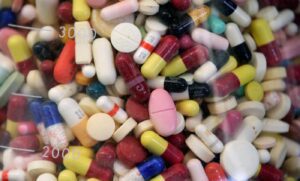I was fortunate enough to sit down with my friend and colleague, Dr Joshua Gear, to discuss the impact COVID-19 has had on our collective mental health, and how we’re doing with regard to coping with the crisis, substance abuse, and what’s next.
Ben Locwin: Dr Gear, thank you so much for taking time out of your very busy schedule to talk with me today. I feel like so much has changed over the past year — for everyone. It has led to untold negative effects on children, adolescents, and adults. How has it been within your practice over the past year?
Dr Joshua Gear: These are difficult times but also remarkable times we are living in. And my own kids (2 in college and 2 in high school) have let me know I don’t have to keep reminding them that they are experiencing and living through a profoundly significant historical period.
One of the biggest effects on my practice, along with every other medical practice I know of, is a conversion in whole or in part to telemedicine.
Not having the patient in my office adds to the challenges of the diagnostic and treatment process, but on the flip side, it provides some convenience for many patients. Once this pandemic is over, I think many work settings, not just in medicine, will have made some big, permanent changes in regard to how we meet and interact with each other.
A more significant impact on my practice and I think more to the point of your question is how this pandemic is effecting the mental health of us all.
The effect on any individual has a profound impact on his or her family and on the family dynamics, especially as access to supports outside the family, for example friends, schools, social and physical group activities, houses of worship, are much more limited.
So the challenges are at least two fold. Our routines have necessarily changed due to the pandemic, but also while many are managing ok financially, many families are struggling, adding another huge stress.
Depression tends to get worse with isolation and challenges like financial stress. These are anxious times and so many who had not experienced anxiety disorders before are experiencing them now. Many students with problems with focus and attention or other barriers to learning are profoundly affected by not being in the classroom where support is more accessible. So, there’s been an understandable increase in depression, anxiety, and challenges to learning.
And so it has been a challenging year. My patients are up against more problems, their needs are greater and resources are more limited. That being said, there have also been many situations in which individuals or families have pulled together and have met these new challenges and are better for it.
BL: It seems in the medical literature, there’s scant — but real — evidence that COVID-19 affects certain mentally disordered patients to a greater degree than the general public. Do you think this is true? What’s going on here?

JG: As you know, why and how we are influenced by things like COVID-19 are multifactorial.
Grossly oversimplifying for a moment, we might break these factors down into two categories, biological and behavioral.
While all medical conditions are influenced by behavior as well as biology, arguably psychiatric conditions are the most profoundly influenced by changes in behavior or in the environment, including the changes that have occurred as a result of this pandemic.
That being said, there’s evidence that among the direct biological effects of the SARS-CoV-2 virus is the potential for dysfunction of endothelial cells, cells which line blood vessels, which in turn may result in unique effects on different organ systems. This is part of the reason for such a vast array of presenting symptoms of infection.
The brain is the organ I’m most focused on in my practice so, how is the virus and/or the body’s immune response to this particular virus, affecting the brain? The answers are far from clear, but almost certainly changes in blood flow and inflammation are playing a large role.
A recent study, for instance, has shown that individuals with schizophrenia are both at higher risk to contract COVID and to die from the illness. Larger studies will need to be done to better understand this phenomena, and in particular to determine how this increased vulnerability is a function of how the schizophrenic brain works.
But as you are very well aware, COVID-19 is affecting us quite profoundly, even if we are not getting infected by the virus. And to answer part of your question, yes, I believe individuals struggling with psychiatric conditions, and not just schizophrenia, are more affected by this pandemic. Quite simply conditions like anxiety, depression, and ADHD, as well as schizophrenia, are often exacerbated by stress, uncertainty, loss, lack of structure and changes in routine.

BL: For some, keeping kids out of school and remote has been a poor decision. For others, this may not be the case. Can you explain what you’re seeing in terms of the convergence of biological mental illness along with the effects of isolation (retardation of social development) in children and teens?
JG: Some of my patients have actually done better both academically and emotionally through remote learning. There are a lot of reasons for this and it will be interesting to look at down the road as more data becomes available. And as you and I wrote about back in August, whether we like it or not, we are all part of a “community wide social experiment” as we try to understand the best ways to approach this pandemic.
But yes, for many students, not having in person school and the personal access to teachers, coaches, administrators and classmates for at least a couple of days a week has been devastating. And the problems often show up in the areas of academic progress, social development, and emotional stability.
And there are a lot of reasons for this.
Learning relies on communication. And in the classroom, a great deal of that communication is nonverbal. Interactions including eye contact, a quizzical look, and a reassuring smile can greatly bolster the communication between teacher and student.
With remote learning, this part of communication is mostly lost, and for many students learning is not nearly as effective.
Now you add challenges that students may have in regard to executive functioning, problems with things like focus, organization, planning, impulse control, and the barriers to learning become even greater.
And some students with specific learning disabilities needs specialized teaching and support that is often hard for them to get outside of school.
These problems with academic progress may lead to loss of self-esteem, increased anxiety and other issues.
And school is not just about academic development, it is the place where many kids develop socially as well. Just like in academic learning, nonverbal communication is an important part of socialization and its absence complicates the process. Despite social media, and frankly often because of it, many kids are feeling more isolated and disconnected and lonely. Losing the opportunity to connect and interact in the classroom and on the playing fields has been very hard for many.
The disruption in structure and loss or support and engagement that many kids benefit from in school has led to a worsening of depression and anxiety for many. Families often do a great deal to make up for the losses but it sometimes is not enough or does not have the same effects.
It can become a vicious cycle, with academic struggles and social isolation leading to increased depression and anxiety which exacerbates the academic struggle and social isolation.
BL: Are there any mental health medications that are being trialed or used with some degree of success in children or teens who are suffering with these medical challenges?
JG: Again, going back to the fact that we know a lot about the human body and the brain, but also there’s a tremendous amount we don’t know and are still learning about.
There have been some fascinating studies with the medication fluvoxamine, the brand name is Luvox, which is an SSRI used to treat OCD. In these studies, people who were treated with fluvoxamine immediately after getting infected with COVID, were much less likely to develop a serious case of COVID and seemed to recover more quickly than patients who did not get treated with fluvoxamine.
It is known that SSRIs, especially fluvoxamine, stimulates a specific receptor that has the potential to inhibit the inflammatory response in endothelial cells that can make patients infected with COVID really sick.
While more studies need to be done, it may turn out that individuals taking fluvoxamine and perhaps other SSRIs, have some protection from getting severely sick by COVID.
BL: It has recently been reported that a matched-group analysis between 2019 and 2020, with about 95,000 patients in each group, showed that visits for psychiatric care increased significantly in 2020. Additionally, the increased uptake in telemedicine visits in that time period was 264% greater. Worryingly to me, the greatest increase in telemedicine treatment type was for addiction, with a 42% increase.
BL: On the topic of drugs and what’s going on with the nation in terms of abuse, the best available — and relatively current — data that I have indicate that in 9 states in the US, more than 70% of drug overdose deaths are due to synthetic opioids. That’s shocking. By the end of last summer amid the pandemic, the American Medical Association reported an increase in opioid abuse deaths in 40 states, and the CDC suggests that emergency department visits for opioid overdoses in 2020 during the pandemic were 29% higher than in 2019. What do you think is causing this, and has COVID-19 had an effect?
JG: This is a crisis that is very real, very sad and, I’m afraid, has the potential to get even worse.
We often refer to deaths from drug overdose and suicide as “deaths of despair.” To be clear, many drug overdoses are not intentional and are not suicides. But excessive drug use — and I would include excessive alcohol and marijuana as well as opiates — like suicide, is often the result of despair or depression.
Two major contributors of despair are social isolation and financial stress. We are almost all affected by some increased level of social isolation. The financial stress many families are experiencing that is directly due to this pandemic can be absolutely overwhelming.
So two of the biggest players in despair, isolation and stress, have been magnified many times over by COVID-19. A dramatic increase in substance use, and the subsequent sequelae, including the intentional or unintentional death by overdose, should be expected.
BL: Any last words of advice for our viewers and readers? I know people are constantly asking me questions about managing these incredibly challenging and complex themes.
JG: Wash your hands, wear a mask, get fresh air, hug your kids, and check in on your neighbors. And repeat.
BL: Thank you so much for spending time with me to discuss these critical topics for our state — and every state in the nation, for that matter.
JG: And thank you Ben, for your ongoing efforts to keep us all up to date on the research and best practices and in helping us understand this very complex information.
Dr Ben Locwin has been working on vaccines and international public policy to end the COVID-19 pandemic, and has worked in the development and FDA approval of some medical psychiatric treatments.
Dr Joshua Gear runs a Child and Adolescent Psychiatrist clinical practice in Portsmouth, NH. He has been spending time understanding the nature of the pandemic’s toll on mental health within our communities; often an under-represented component of the public narrative.
This article originally appeared on Psychiatry Advisor





